
On my recent trip to Africa, I disciplined myself to keep a daily journal of what transpired and how I felt about it. These entries are from that journal.
Wednesday, October 26, 2005
Experience #5 – Still More Animal Reflections
Lion – It is not just Disney that calls the lion the “King of the Jungle.” The oft repeated phrase among the Africans was, “He is the king.” Or, “There is a reason he is called the King.” The lion will attack and usually kill anything when the hunger is enough.
We drove up to where a male lion was resting. It was about 9:30 in the morning. The male lion was sleeping seemingly oblivious to our presence just 20 feet away. I stood with my upper body protruding out of the opening in the top of our vehicle amazed at his size and beauty. We were told by one regular there that there were two young cubs in the bush and if we would be quiet, they might come out for us to see. Where there is young, there is a mother.
We then were aware off to our left, a very young gazelle that had gotten separated from the herd and was walking all around the lion that seemed to ignore it. After a few minutes our driver started to move toward it. I asked him to stop, pointing out the female about 25 yards away stalking the young gazelle. I kept repeating this, but he did not hear me, or did not care to, and drove between them, causing the gazelle to leave. We moved where they could see the female, but I kept my eyes on the gazelle, knowing something would soon be up with an inexperienced animal separated from the herd like that. Another vehicle came between us, and I lost sight. Everyone around started making a commotion, and commenting that the male was up and moving so we could get close. We drove back over; to discover the young gazelle in the mouth of the lion as the last of its life was squeezed out as the male suffocated it.
One of the men from another vehicle told me that he was watching as well; when he saw the lion raise his head, see the gazelle and was upon it in an absolute instant. When he appeared to be asleep he was just exercising the trait that any good predator must exercise . . . patience.
As he stood there completing his kill, he was only about 15-20 feet from us. He then walked to a shady place where he began the slow process of eating a meal that had been delivered to him, not one that he had hunted down. The “lion lying with the lamb” will never be read the same by me!
Our guide said he probably was not that hungry, but could not pass it up since it was close, and he could always eat. One lady in our jeep said, “Will he take it over to feed the young?” “No,” was the reply. Actually a male will take food from the female and young. It is up to the lioness to feed the young. The male lion provides protection from any predator that might endanger the others, including the young. So much for family values and the providing father!
Friday, December 30, 2005
Out of Africa: Part 10 (Continued – D) – Full Day of Debriefing, Reflection and Relaxation
Thursday, December 29, 2005
Out of Africa: Part 10 (Continued – C) – Full Day of Debriefing, Reflection and Relaxation
 On my recent trip to Africa, I disciplined myself to keep a daily journal of what transpired and how I felt about it. These entries are from that journal.
On my recent trip to Africa, I disciplined myself to keep a daily journal of what transpired and how I felt about it. These entries are from that journal.
Wednesday, October 26, 2005
Experience #4 – Still More Animal Reflections
Zebra – These animals “look like someone painted them,” as one of my colleagues said, are certainly not endangered. They are everywhere. On the drive over, we saw what Americans call “road kill.” It was a zebra! They are very prolific. Unlike their horse cousins, they will sit or lie down just to rest or scratch themselves. We saw hyenas finishing off a zebra kill after the lions had finished.
Gazelle – They appear as graceful as on TV. It was interesting to observe them as they move along the savannah. They keep close together for safety. You will often see one lone male outside of the herd, because the dominant male has expelled him. A baby separated here became breakfast as described in the lion discussion.
Impala – Similar to the gazelle, only smaller. I have a photo of two males fighting, probably over a female . . . just like humans.
Water Buffalo – We have seen these creatures sparingly. There were 3 or 4 in the group we first saw. The second group had about 10-12. The primary comment made to us is that they will put up with your presence for a while, and when they have had enough, they will charge, and sometimes that time period is extremely short. They are large, so that in and of itself is bad. But they do not charge alone. If one charges you, they will all charge you. Most animals will usually go away from a human and only charge if given reason, a water buffalo needs no reason. Also, they know that humans will go for a tree, so one will go ahead of you and cut you off at the tree. You have no where to hide.
Crocodile –Large and vicious. Some members of our group saw them drag a wildebeest under and kill it to eat during a wildebeest river crossing. A wildebeest is no small animal. There are differences anatomically and physically in the crocodile and the alligator, but you can read those anywhere. One difference pointed out to us by the Africans compared to a member of our group who lives near the everglades, is that an alligator will generally run from a human, unless there is no escape or there is some other reason to attack. A crocodile will almost always attack and hunt a human when presented with the opportunity. We stayed clear of the water, not only when they were around, because you cannot always see them.
Rhinoceros – Fierce and large! One female we saw was as large as the jeep we were riding in, and this was no small jeep, it carried nine passengers. They will tolerate your presence for some time. Their eyesight is poor, that is no myth. We drove up to within 25 – 30 feet of the two we saw. After a bit she turned her backside to us and snorted a bit. Ole Masi said, “She is irritated with us now. That was a warning. The next turn will be towards us and a rhino will indeed charge anything once it decides to do so. We had better leave now.” And since a group of rhinos is called a “crash,” we turned and drove away.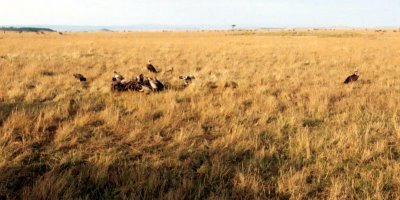
Vulture – Numerous, but not as much as I originally thought. They keep the jungle clean after a kill. We drove by 4 or 5 of them on the way in and they were huge!! They were 4 or 5 feel tall and their wingspan had to be at least seven feet. The next day we got photos of 20-25 of them finishing off a wildebeest kill.
Wednesday, December 28, 2005
Out of Africa: Part 10 (Continued – B) – Full Day of Debriefing, Reflection and Relaxation
On my recent trip to Africa, I disciplined myself to keep a daily journal of what transpired and how I felt about it. These entries are from that journal.
Wednesday, October 26, 2005
Experience #3 – More Animal Reflections
Disclaimer: No Animals Were Harmed in the Writing of these Posts
Giraffe – They are as large as they appear. They are in abundance here. They appear graceful on TV, but not so much here. They tend to lumber along. They will be eaten by lions. The lion will attack them while they are drinking water. The valve in their throat will close breathing when they bend over to drink, and the lion will attack them and suffocate them. In actuality, that is how the lion kills almost all of its prey, by suffocation. It grabs it prey by the throat and holds on until they die.
Elephant – Huge as you would expect. However, they not as cute and docile as you would think from zoos. Amazing Videos on TV will lead you to believe that the rampaging elephant is an exception, when in reality, it is their nature. An elephant can and often does attack humans.
The Kipsigi farmers whom we were among part of the time, as well as the Masai consider them to be pests. They are extremely destructive. There are entire fields of trees, less than a mile from where we were staying, that were leveled by elephants coming through. They come through a farmers crop and what they do not eat, they will trample. This field may have been his family’s food for the next year. They have even eaten an entire field of corn, off the stalk, and the farmer does not know his crop is destroyed until he goes to inspect the field.
They are very fast when they attack. One chased a jeep with our group members in it because it came too close for its comfort. Our guide said, he is just warning them. He can go much faster than that if he desires. On our smaller group’s game drive before everyone else arrived, we were near a herd of elephants. After watching them, we rounded a bend only to see a male about 300 yards behind them down a hill feeding. Ole Masi told us that was the dominant male. He pointed out that it was mating season (pointing out the physical evidence – again, enough said) and said this animal was very dangerous, especially if he thought we were between him and a female in his herd.
Elephant having a great memory is true. It is not an old wives tale. They also are very communal as are most animals in the wild. An elephant will live 60-70 years. When they are old and their teeth fall out and cannot travel with the herd, they leave them by water. Later, maybe a year or more when they travel by, they will check on them. If they have died, they will all trumpet and cry. Then they will get branches and cover the body. That is also what they do if an elephant dies another sort of death.
Two of the staff in our group were charged by an elephant while on a motorcycle because they inadvertently got between the mother and its baby, a no-no with all wildlife. They escaped only because they were on a motorcycle and were able to ride into the thick brush up wind.
Wildebeest – As numerous as you can imagine anything being. So much so that one of the other pastors here said God could have told Abraham “your offspring will be like the wildebeest on the Masai Mara.” This is the time of year when most of them have migrated south across the famous Mara River to the Tanzania side of this savannah grassland. When they return migrating, we are told the land is simply black. They estimate 4.5 million of them are here. Not an endangered species by anyone’s stretch.
The locals told us, “They are very stupid animals. They will not even know you are beside them many times, and if they do, they do not know what to do.” They even look a bit on the dumb side when you look directly at their long face.
Our guide spoke word for word what I have said in America watching them on TV. The only purpose they can see for the wildebeest is to provide food for the lions and cheetahs. That is clearly an overstatement of the ridiculous for they surely help the ecological balance here, but you get the picture.
Friday, December 23, 2005
Out of Africa: Part 10 (Continued - A) – Full Day of Debriefing, Reflection and Relaxation
On my recent trip to Africa, I disciplined myself to keep a daily journal of what transpired and how I felt about it. These entries are from that journal.
Wednesday, October 26, 2005
Experience #2 – On Safari and Animal Reflections
The next couple of journal excerpts will be focused on the fun part of the trip – the excursion into the world of the jungle. This is every man’s Disneyland! For the non-nature lovers, I simply say, “Good-bye.” For those interested in the wildness of nature, I hope this is interesting and possibly enlightening. Remember I am not a zoologist. For the most part these are just facts the locals shared with me.
The day for me began by getting up at 5:30 am to prepare for a 6:15 am departure on a game drive. This in itself was an incredible experience. I have been on two already since we were living right beside the Masai Mara, but this one allowed us to see three animals that we had not seen yet. We were able to see hippos, crocodiles and lions for the first time. You cannot appreciate the incredible creative nature of God by seeing these animals in a zoo – although I have no problem with that. But, there is something about being 100 – 200 feet from these animals that cannot be described.
We saw lots of young. It is spring here, so it is mating season. Enough said. Dogs, chickens . . . fights.
Hippopotamus – A hippopotamus is absolutely huge. Words do not do these incredible animals justice. You do not realize until they get out of the water and are standing 50 feet from you. Here is an interesting fact: a hippo is one of the most dangerous animals in the wild when you begin to talk about Human Wildlife Conflict. More humans are killed each year by hippos in this region than any other animal I was told. Since they hang out near the water, where humans come and they are often invisible to the human eye, they come in contact with humans a lot. Hippos do not like humans. They will chase a human simply for the purpose of killing them. They are very fast for an animal their size. (Almost everything with four legs will outrun things on two legs.) Once a hippo charges you, you very well could be a goner if you are not in a vehicle or holding a weapon. They have these enormous teeth that they simply gore you with. Masai warriors are known for killing hippos. Where we stayed the previous four nights there is one killed every year in the dry season searching for water. The Masai warrior has deadly accuracy with their spear. They also can run incredibly fast, jump incredibly high, and climb with amazing skill and speed. This allows them to be able to kill this extremely dangerous animal when need be.
Baboons – They live right outside our hotel. There are warnings in your hotel that if you leave the doors to your “balcony” open and food visible a baboon wi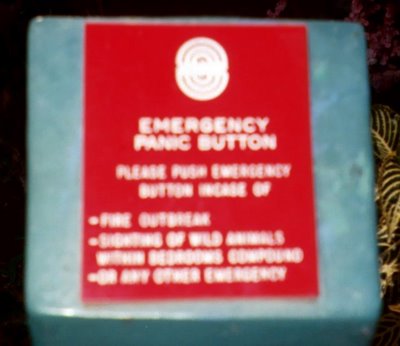 ll come in your room. They are very intelligent and can open the door if you do not lock it as well. Two pastors last year left their door open when they left once with some snacks on the table, only to come back and find baboons in their room. They are strong and dangerous, so this is not good. There is an emergency button to push outside of our room. It lists two reasons to push the emergency button. The first is fire; the second is wildlife in your room. Enough said.
ll come in your room. They are very intelligent and can open the door if you do not lock it as well. Two pastors last year left their door open when they left once with some snacks on the table, only to come back and find baboons in their room. They are strong and dangerous, so this is not good. There is an emergency button to push outside of our room. It lists two reasons to push the emergency button. The first is fire; the second is wildlife in your room. Enough said.
Oh, as I was writing this a baboon just ran by my door. He looked in at me and started to come in until he saw me! The three guys in the next room just squealed like schoolgirls.
Thursday, December 22, 2005
Out of Africa: Part 10 – Full Day of Debriefing, Reflection and Relaxation
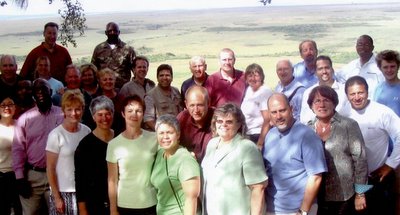
On my recent trip to Africa, I disciplined myself to keep a daily journal of what transpired and how I felt about it. These entries are from that journal.
Wednesday, October 26, 2005
Experience #1 – Future Partnership
There is great value in reflection following an experience such as this. So many thoughts are rumbling through your mind that you simply need time and space to process, analyze, listen to God and determine what is going on inside and what He is going to do in my spirit, life and ministry as a result of this trip. In my case it impacts an entire church.
This afternoon John Thompson and I sat down and talked about 45 minutes or more about Fountain Park’s future involvement. (He is the World Vision US C2C Coordinator, who by the way lives in Greensboro, NC less than an hour from my hometown of Kannapolis, NC. Our schools used to play one another in high school football. It is a small world. He is the man in the very center of the above photo who jumped in at the last minute.) We had already had 3-4 discussions in this vein throughout the weekend, but this one was directly about how they could assist us in the decision making process. Our discussion centered upon what I think God will want us to do in partnership with World Vision as a follow up to this trip. I am sure it will be something. I told him I came here with no agenda, and I leave with none.
I leave with none.
I have an idea of what I think God will want us to do, but I will have to see how that plays out. When I return I intend to meet with my local World Vision representative to ask some questions in preparation for a meeting with Fountain Park folks and discussing our involvement with this ministry. I was pretty honest regarding two primary issues that impact where Fountain Park will end up. The first is that we already have at least two other options for partnerships in overseas missions. The first is in Brazil and the second is potentially partnering with a woman several of us have known who is working with the Kurds in Iraq. I / We have some work to do in our evaluation process.
Wednesday, December 21, 2005
Out of Africa: Part 9 – Exiting with Sadness (Continued)
On my recent trip to Africa, I disciplined myself to keep a daily journal of what transpired and how I felt about it. These entries are from that journal.
Tuesday, October 25, 2005
Experience #2 – Arrival at Debrief Hotel
We arrived at the Masai Mara hotel around noon. The entire staff came to be with us. Many photos and good byes were exchanged. As they left, I realized the reason they came was because, many of them had never seen this place, and they truly hated to see us go. Each of them told us that we were an encouragement to them. It was genuine; they are truly God’s choicest servants!
This hotel is extremely nice by any standard. There are differences from an American luxury hotel because we are hundreds of miles from what we would call civilization, but it is very nice. I told the other four guys at lunch the reason for this is to remove all distractions and put us in an environment as much like we are accustomed to back home so we can thoroughly process what has taken place in our lives over the past eight days and especially the last four.
Masai Mara is the name for the Kenyan side of the Serengeti. So when folks asked if I was in the Serengeti, the answer is “yes.” It is also interesting to sleep with a mosquito net due to the prevalence of malaria.
The entire team was back together at dinner tonight. It will be the first time we had all been together since last Thursday evening. Each main team, Rwanda, Ethiopia and of course Masai in Kenya took a few minutes to share some stories that impacted them. Tomorrow evening we will have a fuller sharing as a group.
After the evening meal, Gary, Joshua and I sat at the table and talked for a while. We are from very different and very similar backgrounds. I had prayed, and asked many others to pray, that the pastors on this trip would drop their pretenses and just be real. Well, that has happened with many individuals, but with these two men it has happened in a much more real way. There were numerous factors playing into it. God is doing something very unique in each of our lives and we are each trying to determine exactly what it is He wants us to do. All three of us have had very difficult and somewhat painful experiences in our churches in recent months and it has left us wounded and doubting a lot of things that anyone who is not in pastoral ministry would have a difficult time understanding. Secondly, there are difficult staffing issues awaiting us when we return. This leaves you wondering about lot of things while you are gone from the primary location of ministry.
As I plan my return in two days, I will take back much learning from these two men. I will most definitely need it while looking at what the next six months hold for me.
Tuesday, December 20, 2005
Out of Africa: Part 9 – Exiting with Sadness
 On my recent trip to Africa, I disciplined myself to keep a daily journal of what transpired and how I felt about it. These entries are from that journal.
On my recent trip to Africa, I disciplined myself to keep a daily journal of what transpired and how I felt about it. These entries are from that journal.
Tuesday, October 25, 2005
Experience #1 – Farewells
After breakfast this morning we packed to leave. After packing, we all gathered in the “lounge” area where we held devotions. We have had this each morning. It is pretty incredible listening to the African men sing. I do not think I have mentioned before, but we sing almost exclusively American hymns along with some African chorus. The hymns are mostly songs I recall from my teenage years in the Baptist church. I must be honest, there is something pretty powerful in the singing in a room with all men, from various cultures, who love Jesus and just pour out their heart to God.
This morning I was the one who gave the devotional thought. The other two pastors had shared the previous two days. The entire staff of this project area joined us for devotions this morning. I shared from Genesis 41 where Joseph named his two children Ephraim and Manasseh. This is one of my favorite passages to speak on. I know some of you have heard this talk before. Manasseh means “to forget.” Joseph named him that because God had enabled him to forget all the trouble he had been through and forgive the perpetrators. If anyone in history had a reason to hold a grudge, it was him, and he did not. One thought I shared was “there comes a time in everyone’s life when they have to realize, that they cannot change their past.”
The other son he named Ephraim. Ephraim means “to be blessed.” Joseph said God had blessed him in the land of his suffering. The idea is that Joseph saw God’s blessing in the land of suffering rather than always seeking to be delivered from his suffering. Enough said.
Following devotions the staff presented each of us with African gift that is supposed to have been tied to our character as they observed it over these days. These are gifts that I will cherish for the remainder of my life. Ask me how I am a twofold Masai Warrior Chief!
Monday, December 19, 2005
Out of Africa: Part 8 (Continued - B) – Final Full Day
On my recent trip to Africa, I disciplined myself to keep a daily journal of what transpired and how I felt about it. These entries are from that journal.
Monday, October 24, 2005
Experience #2 – First Game Ride and More Discussions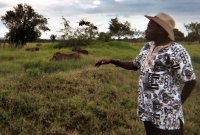
This afternoon we took short game ride. It would be the first of three we would take in the next three days. I learned a ton about animals and HWC (Human Wildlife Conflict). I was taught a lot about the hippopotamus, elephant, wildebeest, and even the cow! I spent considerable time talking to Simon Ole Masi as we rode the Masai Mara and watched the animals. He is an amazingly intelligent man. I will give a lot of the information I gathered here in entries to follow over the next couple of days.
After the game ride, I had my first hot shower since last Friday morning. Hot water was available, but by the time I got to the shower each day it was gone, so there was only cold water for me. Because of that, I kept showers very short and most days skipped the shave altogether. After this long hot shower, I feel like a new man. A shave and shower just does something for you that cannot be achieved any other way.
We sat around after dinner and talked with Phiona (pronounced Féona) about the HIV pandemic and its affect in this area. She is Masai herself and has come back with World Vision to serve her people here. I was greatly impressed by her servant spirit, knowledge and ability. She shared many stories that revealed once again that HIV’s chief weapon here is stigma. I also learned that this is yet another reason the women want a maternity clinic. Since blood is one of the four primary bodily fluids to pass on HIV, (the four are: blood, semen, vaginal fluids and breast milk) children here are at risk, because Masai women bleed a lot during childbirth. A clinic could serve to protect the unborn children. It also has another positive protection for children. If women learn they are HIV positive, they can be taught to refrain from breast feeding and thereby passing on HIV to the infant child.
HIV and its devastation simply cannot be escaped here!
Sunday, December 18, 2005
Out of Africa: Part 8 (Continued - A) – Final Full Day
 On my recent trip to Africa, I disciplined myself to keep a daily journal of what transpired and how I felt about it. These entries are from that journal.
On my recent trip to Africa, I disciplined myself to keep a daily journal of what transpired and how I felt about it. These entries are from that journal.
Monday, October 24, 2005
Experience #2 – Visiting My Sponsored Child
After M & M football we traveled back to the school where we had the incredible reception and program on our second day in the field. I had no idea that the child I sponsored attended that very school and that we had driven by his home days earlier.
The boys name is Loongishu. It means son of the cow. As I talked to him through an interpreter, I learned that he desires to be a teacher. In this area that is an absolutely huge need. I had brought him a couple of small gifts. One was a Pittsburgh Project ball cap that my oldest daughter had given me. It was a cool way of connecting him with me and my children. I also gave him a photo of me along with my Grandson Gavin.
He sat up front with me in the vehicle as we drove to his home to meet his father and his mother. His house was a pretty incredible site. There were Bi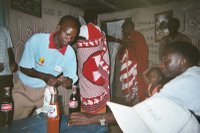 ble verses written on the walls inside and outside of his home. We were invited inside for a “soda,” and just as before we were given Coca Cola and Fanta Orange.
ble verses written on the walls inside and outside of his home. We were invited inside for a “soda,” and just as before we were given Coca Cola and Fanta Orange.
As we sat talking we learned that Loongishu’s Dad has two wives, both of whom are Christians and have been for several years. His father was not a Christian. With all the verses around, Gary could not resist (I am sure prompted by the Holy Spirit) beginning to ask his father if he has ever thought of becoming a Christian. When he said yes, I had the privilege of praying with him as he accepted Christ. Now, do not get me wrong. I deserve zero credit here. It turns out that both of his wives had been praying for him for five years to become a Christian. They not only prayed for him but lived a life in front of him to cause him to desire to accept Christ when presented with the opportunity.
I once heard a man talk about how when a m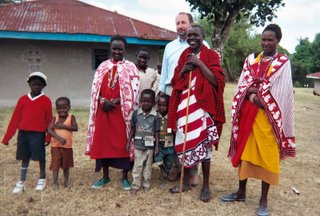 an in these cultures becomes a Christian he should divorce one of the wives, preferably all but the first, so he only has one wife. I thought to myself, “My, what an idiot. Have you any idea of what that would do to those women? It would just throw them out to fend for themselves along with their children in a culture where they have no ability to earn a living and care for anyone.” Before you go off on me, I am not promoting polygamy. I believe God’s intention was one man and one woman, and each man should have one wife in any culture. But in cases where there are already family units intact and disrupting what is already in place would put women and children at risk, there is no reason to force a change upon them.
an in these cultures becomes a Christian he should divorce one of the wives, preferably all but the first, so he only has one wife. I thought to myself, “My, what an idiot. Have you any idea of what that would do to those women? It would just throw them out to fend for themselves along with their children in a culture where they have no ability to earn a living and care for anyone.” Before you go off on me, I am not promoting polygamy. I believe God’s intention was one man and one woman, and each man should have one wife in any culture. But in cases where there are already family units intact and disrupting what is already in place would put women and children at risk, there is no reason to force a change upon them.
This had been a very eventful day although on a much different plane than our previous days. After some time taking photos, we left with promises of future communication and a continuing relationship that goes beyond financial support, although that is definitely included.
Wednesday, December 14, 2005
Out of Africa: Part 8 – Final Full Day
On my recent trip to Africa, I disciplined myself to keep a daily journal of what transpired and how I felt about it. These entries are from that journal.
Monday, October 24, 2005
Experience #1 – Time Spent with Sponsored Children
Each morning we met to begin our time together with devotions. Joshua shared some challenging thoughts from Isaiah 61 and Luke 4. After devotions we prepared to drive to visit our sponsored children. We would be leaving in two separate vehicles going in two separate directions. As we prepared to depart, I noticed that each morning after we had driven in every imaginable mud road the previous day, the Area Development Project staff had washed the vehicles. I commented on that to John and he said, “Yeah. They take good care of these vehicles.” Once again, I was very impressed with the World Vision staff here in Africa.
Visits to our sponsored children were pretty incredible experiences. There were four children that we had to visit. In two cases we were going to pick them up at school and drive them home to meet their parents. We talked about how strange this must have looked to the children. The parents know their children were going to be sponsored, but there was a lot of explaining ahead of time regarding what “adoption” and “sponsorship” actually mean. Many parents, understandably so, desired assurances that their children would not be taken away to America. Fair enough. Now imagine a four wheel drive with two white men, showing up at their school, and driving away with one of the children. The adults all knew the scoop, but I am not sure the children di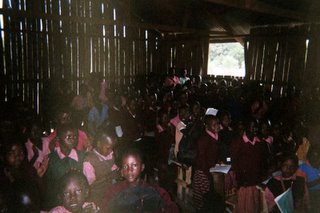 d.
d.
Before departing, the school we visited classes. Here is a sad point; the children were literally CRAMMED into the classrooms. My best count there were 110-120 kids in the level 4 class we visited. Imagine three rows of ten desks with four children at each desk!! I could not help but think about how many teachers in the US talk about they have 25 kids and it is too many. I am not disputing that, I am just saying, imagine 120!!!
Ole Masi, asked the kids how many of them were seeing a Muzungu for the first time. (I am a Muzungu. A Muzungu is a white man!) At least 45% of the kids raised their hands and laughed aloud. It was a truly great moment for me to raise my hands and say, “I am just like you!!!” And I am. The only difference is skin color. Inside we are all alike. We are all children of God. We are all loved by God equally. We are alike!
After our visit to the first family, we took the boy back to school. They were so excited to see us back. It was recess, and we then did something really crazy. Gary had brought a Miami Dolphin’s nerf football for his child. (Gary is from southern Florida.) We got two teams and taught them to play American football for about 15 minutes. It was a hoot!! They absolutely loved trying to learn the game. I had one interception but it ended a tie game. We did not bother with sudden death overtime. Since we had introduced our African hosts to M & M s the night before, we joked that in ten years, we will see the Kenyan national football team sponsored by M & Ms!!
Tuesday, December 06, 2005
Out of Africa: Part 7 (Continued - E) – African Worship & Community Needs
On my recent trip to Africa, I disciplined myself to keep a daily journal of what transpired and how I felt about it. These entries are from that journal.
Sunday, October 23, 2005 – Experience #6 – Conversation Becomes Graphic
Here is a warning!! This discussion will be quite honest, open and perhaps graphic. Please do not be offended. I intend to be open as long as I am not profane or vulgar. The church has a long history of skirting the discussion of uncomfortable topics. This will be just that for many folks. If you feel that way, please feel free to simply exit the page and return at another time. I have to hope that search engines do not pick me up for pornographic searches as this discussion unfolds.
Many cultures, including America, have set up circumcision as a rite of passage. For the ancient Israelites it was ceremonial and performed on the male child’s eighth day alive. This was for them the time the child was officially given his name. Other cultures have made this procedure a passage into adulthood for the males. This is the approach the Masai have taken.
When a Masai male is circumcised it occurs in their early teen years. It is a major cultural ceremony. The procedure is performed in a public ceremony. The entire village is invited and usually attends. When the circumcision is done, the male is not permitted to cry or shed tears just as at the removal of the two front teeth. If the young man does not cry or shed tears, he will be given a cow by every herdsman present. This could mean he will receive as many as 20 to 30 cows as gifts at the passage into adulthood. It is no small matter to be given a cow since they are so revered in this culture.
If a young man decides to move on to being a Muran, which is a Masai warrior, they should keep themselves pure. This in many cases means they will not have sexual relations until the age of 35. It is no wonder that many of the tribes in Africa are surpassing the Masai in sheer numbers. The number of men who take this route are becoming fewer and fewer. Some simply break the code and do not tell anyone.
Late in the evening we talked to our host Simon Sole Masi about Female Genital Mutilation (FGM) and the need for the empowerment of women in this culture to fight HIV and other social issues. Other than HIV education across the culture, which is primary, a key issue in combating HIV is the empowerment of women. Female Genital Mutilation, or female circumcision, is therefore another major issue in the empowerment of women in some African cultures. (If you do not know what FGM is, you will if you continue to read this entry.) FGM is actually illegal in Kenya, but so is the arranged marriages of young women to older men. Yet, it does not stop both from taking place. (I will write a bit more on the arranged marriages later in this entry.) Things that are that culturally entrenched, die very hard!
When we first asked Simon Ole Masi about this issue he said, “Thank you. I am very glad you asked that question.” It turns out that he did his Masters thesis on that subject in England. He chose that topic because it has almost 100% prevalence among the Masai people and he is Masai himself; so he sought to fully understand it. Ole Masi personally interviewed hundreds of men and women to see what he could learn about the cultural phenomenon.
The first question we asked him was to us the most obvious: “Why?”
It turns out there are three basic reasons in their culture. The first reason is that it is seen by many as a parallel to the male circumcision. It is the passage into womanhood for the female. The second reason is that the female clitoris is viewed as dirty just as the male foreskin is viewed as dirty.
The third reason is the least talked about and the one that in many cases is a control issue by the males. Masai, as I have stated, are herdsmen. This means they are gone from home with the cattle a great deal of the time. If sexual intercourse is not pleasurable, or in many cases is painful, there is little reason for the female to be unfaithful to her husband. This makes the sexual act purely for male enjoyment and a procreative act for the female and ensures her faithfulness.
He later informed us that this is another reason some of the women want a maternity clinic. Some women who manage to avoid this hideous practice, will have the procedure performed on them by a midwife during the birth of their first child. At that time they are in pain and do not know what is taking place. After they heal and realize what has been done to them, it is too late. It is almost as if the older women are saying, “We went through this and you will too.”
I probably should not close this entry without (as promised) explaining what FGM is. We asked that very question, “Exactly what takes place?” Ole Masi said that in his studies he discovered that there are actually four levels of FGM practiced worldwide.
Level 1 – This is the level practiced by the Masai. In this the procedure involves the removal of a portion of the female clitoris. This is similar (sort of) to what is done to the male in circumcision, except that in the male, it does not reduce the enjoyment of sexual activity. That is the case with women. Women who have this level of procedure can still achieve orgasm during intercourse and sexual activity but enjoyment is reduced.
Level 2 – The entire clitoris is removed. It is practiced by some African tribes and some Muslim cultures.
Level 3 – The entire clitoris is removed as well as the labia minor. Extremely painful it would seem. This is practiced almost exclusively by some Muslim cultures he said, although there may be some exceptions.
Level 4 – This is the most gruesome of all. The entire clitoris is removed as well as the labia minor and the labia major. The vaginal opening is then stitched closed except for an area to allow the passage of urine.
As I said . . . hideous!
One final area we talked about was the arranged, and usually forced, marriages of younger Masai girls to older men. There are times where a younger female has kept herself from sexual activity and is free of HIV. Yet because of a sum of money paid to a father, the girl will come home from school and see family all around. She will be told to greet them and next thing she knows she is married to a much older man (many times 60-70 years old) who quite often is HIV positive and infects her! This is often closely tied to the Virgin Cure myth. This belief is that if a male has sex with a non-HIV female, he will actually cure himself by giving it to her!! Many times that is why they take such young brides. This shows the importance of education in combating HIV.
As I sat listening to him I thought, “Talk about empowerment of women issues! No wonder it is such a big deal here!”
Sorry for the length of this day’s discussions requiring five entries. It was very intense. This has been our most intense and most busy day. It has also been the most enlightening and challenging.

